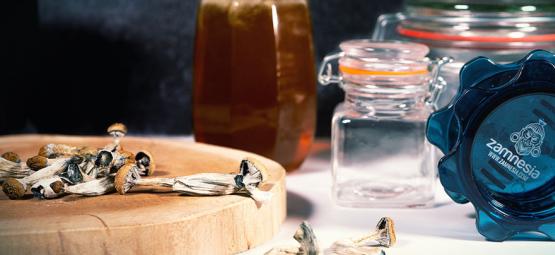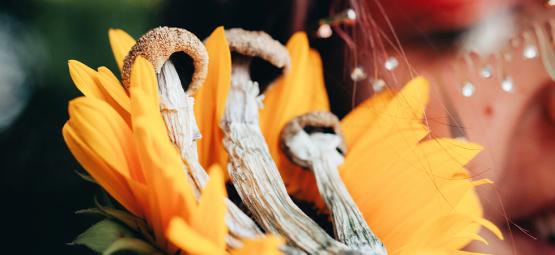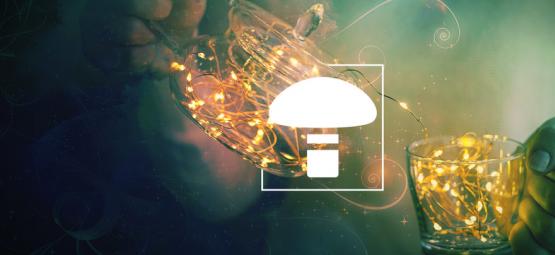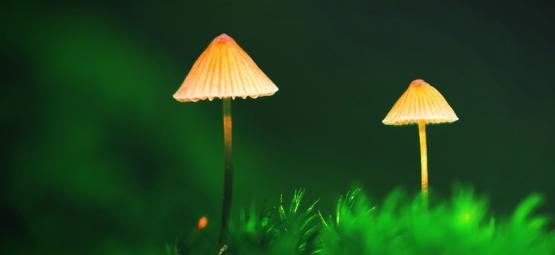What To Know About Shrooms (Magic Mushrooms)
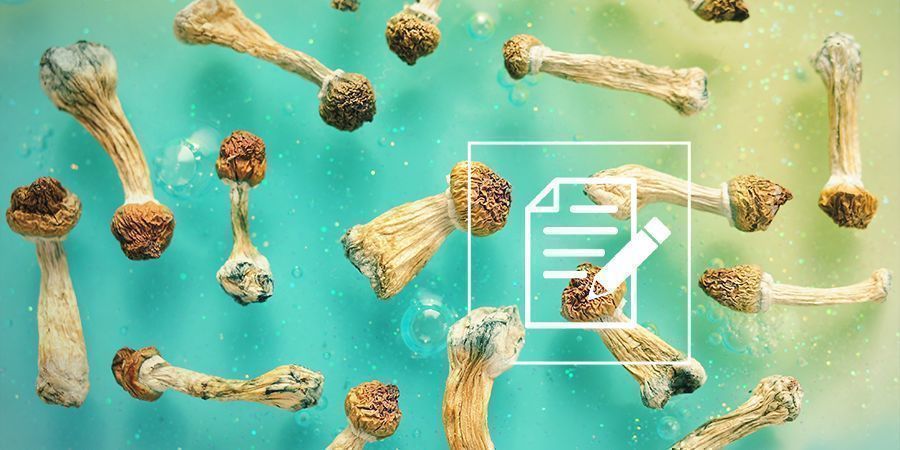
Magic mushrooms are treasured for their strong psychoactive properties, producing strong hallucinations, euphoria, altered thinking processes, and a distinct clarity unlike any other substance. Below we take an in-depth look at magic mushrooms, their various uses, how to cultivate them, and much more.
Hidden within the tissues of magic mushrooms are vast secrets of consciousness waiting to be unlocked. These life forms have fascinated humans with their psychoactive contents since antiquity, and now they can be grown in the comfort of your own home. Learn what gives these mushrooms their magic, and discover everything there is to know about taking and growing magic mushrooms at home.
What Are Magic Mushrooms?
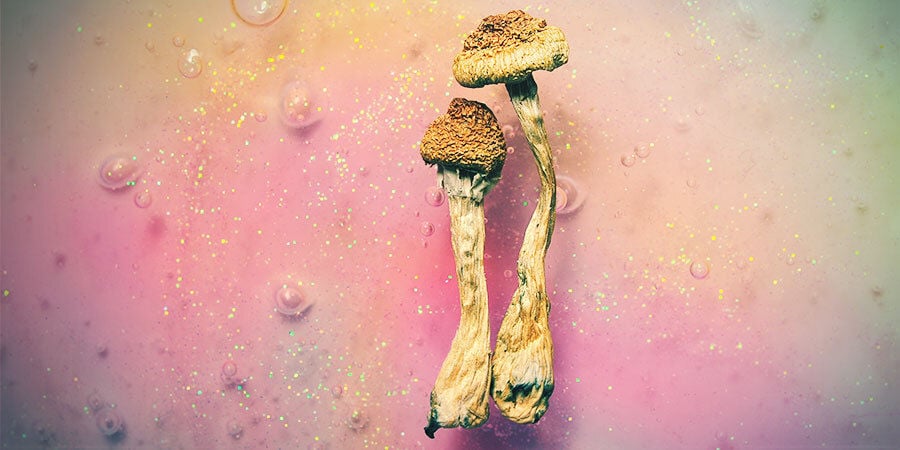
Magic mushrooms are, mostly, those mushrooms that fall under the Psilocybe genus, of which there are well over 100 known species. But, there are other genera too, including Gymnopilus and Panaeolus. What makes mushrooms “magic” is that they contain the psychoactive alkaloid psilocybin.
Famous for causing deep psychedelic experiences, magic mushrooms have been used by different cultures across the world for thousands of years. Evidence of their traditional use ranges from India to South America, and many places in between.
For various reasons, magic mushrooms have become highly controversial fungi, with some people living in near-total fear of them. This is evidenced by their criminal status across most of the world.
However, things are changing. As research into their potential benefits booms, old myths about these mysterious life forms are being washed away, and entirely new points of view are beginning to be formed.
Perhaps that is why you’re here? If you’re after a simple, informative run-down on the facts about magic mushrooms (shrooms), then you’ve come to the right place.
What Do Magic Mushrooms Look Like?
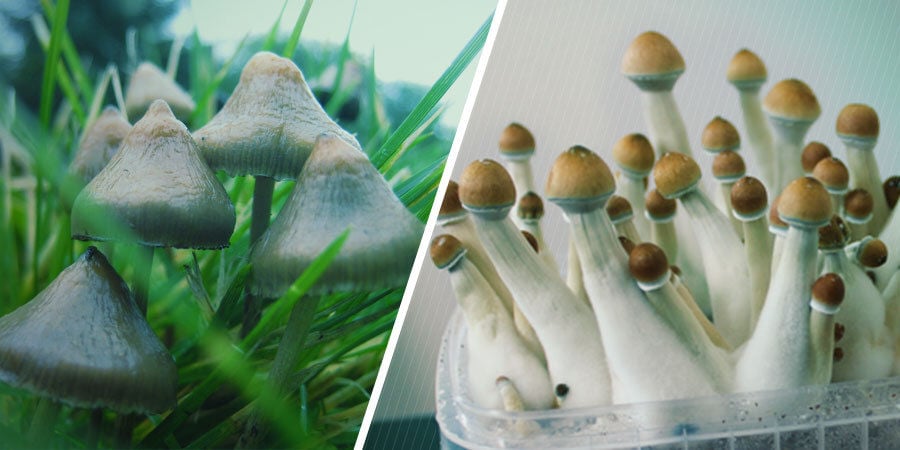
Due to the sheer number of known magic mushrooms, and their variety, there is no single answer to this question. The famous Psilocybe semilanceata, or “liberty cap”, has the classic tapered cap with nipple on top. Though this is perhaps the most distinctive magic mushroom, it is by no means indicative of how they all look.
One thing all magic mushrooms share in common is that they will bruise blue when harvested. This is due to the creation of pigments resulting from psilocybin’s oxidation.
Some shrooms are fat and low, others are tall and thin. Some strains grow in dung, others in rotting wood, and some nestle themselves amongst the grass. Therefore, if you’re going out hunting, ensure you are absolutely certain about what you’re picking. If you get the wrong thing, it could kill you.
Also, verify that what you’re looking for grows locally. It’s shocking how often people go out searching for mushrooms that only grow on a different continent!
Which Magic Mushrooms Are the Strongest?
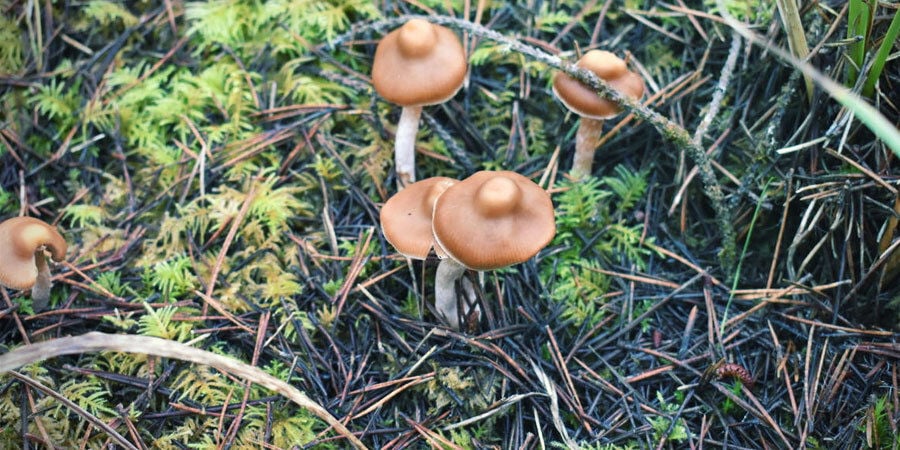
The strongest species of magic mushroom is believed to be Psilocybe azurescens. This species only naturally occurs on the southwestern coast of the US—California and Oregon.
On average, it contains 1.78% psilocybin and 0.38% psilocin. Compare this to cubensis, the most widely ingested species of magic mushroom, which features 0.63% and 0.6%, respectively. With almost three times as much psilocybin, it is clear how potent azurescens is.
Levels of psilocybin and psilocin are not the only factors that contribute to a shroom’s strength. Though these two alkaloids play arguably the most important role, other alkaloids distinct to certain species have significant effects on the quality and character of the high.
For instance, although Psilocybe azurescens is incredibly strong, it is also renowned for having an exceptionally "clean" high, whereas other, less-potent species—such as Psilocybin semilanceata—may have more pronounced visual effects, contributing to a greater sense of feeling high.
What Do Shrooms Do?
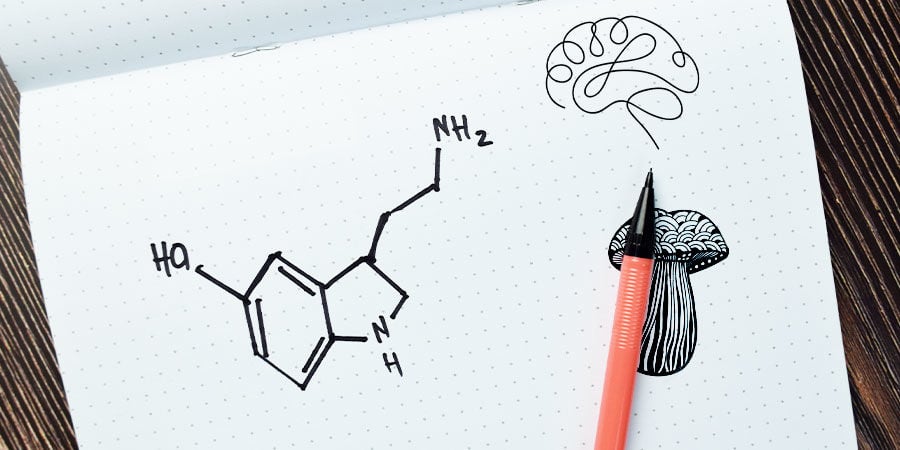
Upon entering the body, psilocybin converts into psilocin, the compound responsible for getting you high. From here, psilocin mainly interfaces with serotonin receptors.
It also reduces the dominance of the default mode network (DMN) over the conscious experience. This part of the brain is thought to “oversee” other brain functions, and acts as a sort of filter. Under the influence of magic mushrooms, these parts of the brain bypass the DMN and communicate directly with one another. This, along with increased levels of serotonin, is thought to produce the “trip”.
Some preliminary research even suggests that magic mushrooms produce a “heightened” state of consciousness.
How Long Do Shrooms Take To Kick In?
This depends on how they are ingested. If chewed and eaten, they should kick in after 30–60 minutes. If made into a tea, the onset is slightly quicker.
If you’re going the lemon tek route (taking a shot of lemon juice and shrooms), the majority of the psilocybin is converted into psilocin outside of the body, making uptake much faster. In this instance, it can take as little as ten minutes for the effects to take hold.
One thing to note, however you take shrooms, is that they must be digested. Therefore, if you’ve recently eaten, it can take much longer to come up, and you’ll find the effects are greatly reduced. It is worth not eating for at least a few hours before taking shrooms, or the experience can be very underwhelming.
How Long Does a Shroom Trip Last?
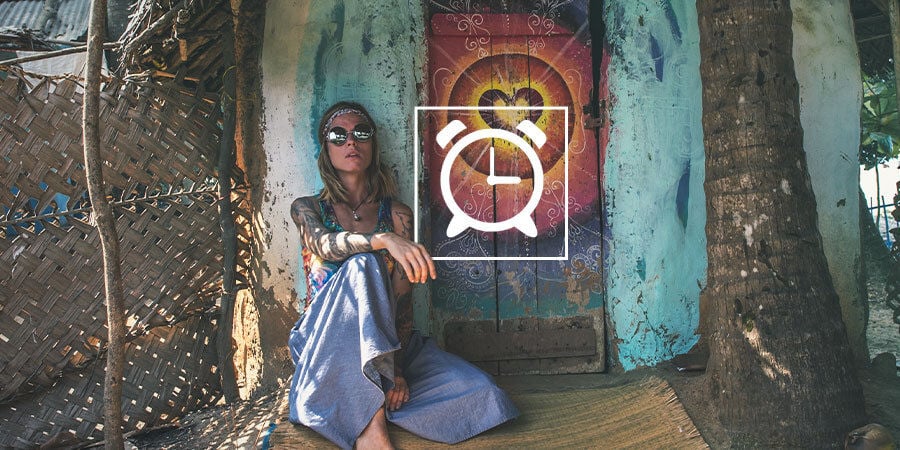
The shroom trip will probably last between 3 and 4 hours, with the effects “peaking” at around 90 minutes to two hours in. You can expect the trip to be more or less entirely over within 8 hours. However, in most cases, you will be fairly sober within 6 hours, although you will feel noticeably different.
With lemon tek, the high will be shorter, as the psilocin conversion means your body can metabolise the whole thing faster.
One of the wonderful things about magic mushrooms is that, unlike with many other drugs, there is no harsh comedown. As the effects begin to wear off, you will feel a bit tired, but "clean". Happiness is the lasting feeling from magic mushrooms (hopefully), with no real hangover.
How Long Do Shrooms Stay in Your System?
Shrooms stay in the system for a fairly short period of time. In the blood and urine, they should be undetectable within 24 hours. In the hair, traces could last up to six months. It’s worth noting that most common drug tests are not designed to detect psilocybin/psilocin.
Are Shrooms Addictive?
No. In fact, shrooms are potentially the least addictive recreational drug in the world.
That being said, you should still exercise caution and use them sensibly. All mind-altering substances will have long-term effects if used recklessly.
What To Do on Shrooms
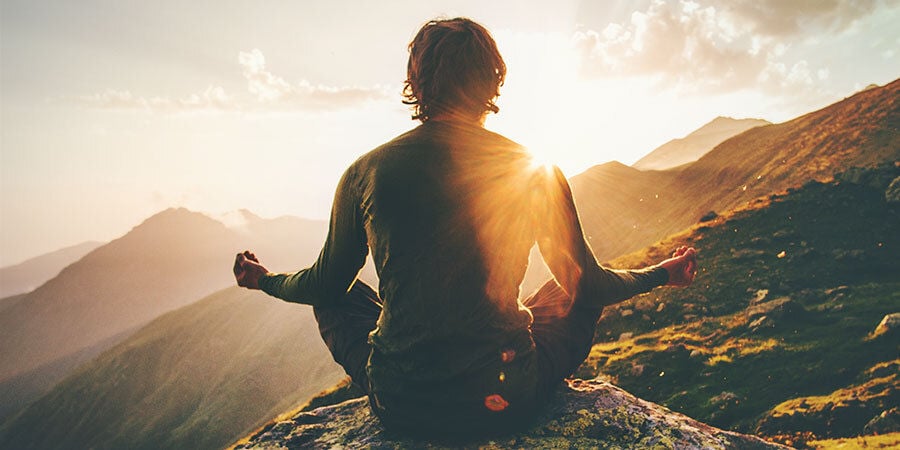
The effects of magic mushrooms can vary from surprisingly gentle to completely overwhelming depending on how much you take (and other factors). Still, you can do a large number of things under their influence. Although, you’ll want to make sure that none of these things require much from you!
Bear in mind that magic mushrooms are a very sensory drug, and therefore activities that are stimulating in a sensory way will be the best (or the worst, if you tend to get easily overwhelmed). Though people differ, having sufficient space to move around is often good for tripping, and being outside tends to be conducive to a good trip.
Below are a few recommended activities for shroom-trippers:
- Be in nature: Going for a casual walk in the woods is the number one best thing to do when tripping. Open spaces and the tranquillity of nature suit the experience perfectly.
- Get physical: Being intimate, whether romantically or in a friendly capacity, feels incredible on shrooms.
- Get creative: Paint, sing, write, and dance with abandon like never before.
- Meditate/Yoga: These practices will take you to a place of absolute serenity.
- Talk/Think: Allow your mind full freedom to explore ideas while tripping.
- Listen to music: Music sounds unbelievably good when you’re tripping, so settle into it.
How To Take Shrooms
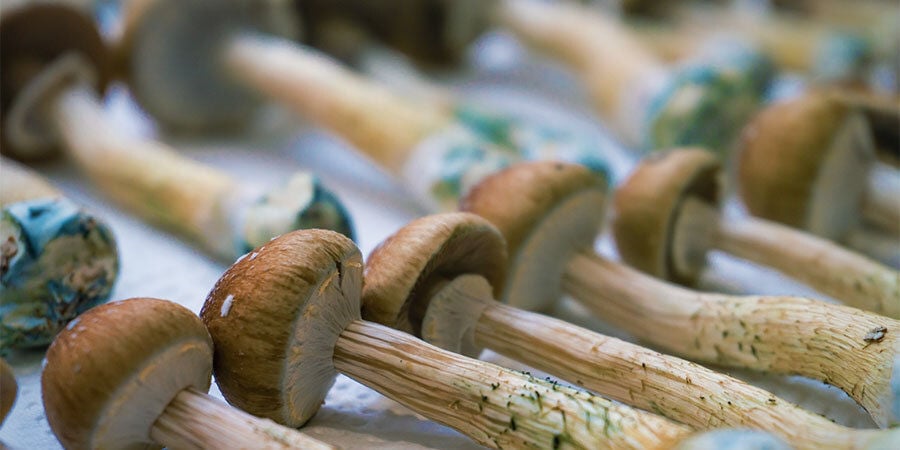
There are many ways to take magic mushrooms, each with its own benefits and drawbacks. However, if it’s your first time, try eating them as is. This method is powerful and foolproof.
Whole Form — Fresh or Dried
You can eat magic mushrooms fresh or dried. If you intend to eat them fresh, they must be consumed very quickly after being harvested. Otherwise, you’ll find they go off astonishingly fast. If eating dry, have a drink to hand!
Fresh magic mushrooms will kick in slightly faster, and wear off slightly faster. Some people report that, like with lemon tek, the effects come on more intensely compared to dried magic mushrooms. However, this is anecdotal. The thought is that fresh magic mushrooms contain more psilocin than their dried counterparts, resulting in a harder, faster come up.
Lemon Tek With Dried Shrooms
Lemon tek involves grinding up dried shrooms and soaking the granules in lemon juice (or anything similarly acidic). The acidity converts the psilocybin into psilocin—a process normally carried out by stomach acid. As a result, the body is more readily able to absorb psilocin, and thus the effects come on sooner and with more force.
For first-time users, lemon tek is not advisable. Not only will the effects of eating mushrooms be plenty strong enough, but lemon tek can be an unreliable process with varied results. Leave it for too long, and the psilocin itself can break down and degrade.
Also, as the effects last for less time, it is better for incredibly intense but brief trips. Most casual users find they prefer slightly weaker but longer-lasting trips.
Shroom Tea
Magic mushroom tea falls somewhere between lemon tek and eating. For those who suffer from nausea when they eat mushrooms, tea can be a way out. As it extracts the psilocybin, this can be drunk without consuming the body of the mushroom. Mostly, it seems to be the chitin in the cell walls that causes nausea on shrooms.
Another benefit of magic mushroom tea is that it can be drunk slowly over a period of time, making gradual uptake possible.
If you want to make it stronger, adding lemon to the brew can pre-convert the psilocybin, and you can have a tastier, diluted lemon tek.
Shrooms With Food or Drink
Shrooms can be taken with food or drink. Blue shroom honey is one possibility. In this instance, ground up shrooms are left in honey for a period of weeks, the psilocybin is absorbed, and the honey becomes psychedelic.
Likewise, ground shrooms can be blended with coffee to produce mushroom coffee. Whether this sounds good is up to the individual. For coffee lovers, it may be the very best way to ingest magic mushrooms. However, for those who find coffee sets their mind racing, taking the two together may not be advisable.
Some people recommend doing things such as putting shrooms on pizza or in risotto. However, really you are just wasting them. Though it may be a fun novelty, by consuming magic mushrooms with food, you are actually just going to massively decrease their potency.
Can You Smoke Magic Mushrooms?
No. Psilocybin breaks down above a certain temperature (lower than that at which it burns), so if you try to smoke shrooms, you will not get high. Also, inhaling fungal spores is probably not a great idea.
How To Dose Magic Mushrooms
This is not an exact science, and will depend on both you and your magic mushrooms. For instance, your weight, metabolism, and experience level will all influence the experience. Also, smaller magic mushrooms contain a higher percentage of psilocybin by weight. So, a gram of tiny shrooms and a gram of monster shrooms will have different potencies.
Moreover, not only does potency vary greatly between individual mushrooms, but wildly between species, as earlier demonstrated.
It’s undeniably tricky to figure out an exact magic mushroom dose given the variation. However, you can make an approximation by using the average-strength cubensis species as a benchmark.
How Many Shrooms To Take
For someone who hasn’t done magic mushrooms before, between 1 and 2 grams should be sufficient. Most people will find themselves comfortably high with 1 gram, and nicely tripping on 2. Below 1g and you will still feel something, but it won’t be a “trip”. Over 2g and you’re still likely to have a great time, but be aware that upwards from there, the high can become very strong.
Microdosing Shrooms
To microdose, it's suggested to take roughly 0.3–0.5 grams of dried shrooms every 2 or 3 days. These are the guidelines most commonly used, though the process is relatively new, and many people will experiment to find their own “sweet spot”. Just be aware, if you microdose, you will find tripping becomes more difficult as the brain rapidly develops a tolerance to psilocybin.
If you want a tailored microdose for your weight and type of mushroom (fresh or dried), use our Magic Mushroom Dosage Calculator! Not only will it suggest an ideal microdose, but you can also use it to determine a low, normal, or high dose of shrooms as well.
How To Grow Magic Mushrooms
You can grow your own magic mushrooms at home, and it can be incredibly easy.
The easiest way to do so is with the help of a magic mushroom grow kit. Designed for beginners, these simply need a bit of water, and within a few weeks you can have up to 50 (dried) grams of your own magic mushrooms.
Alternatively, if you fancy yourself a budding mycologist, you can grow your own from scratch. Though long and challenging, this can be an extremely rewarding experience with unbelievably big yields.
There are a few methods in which to do so. The simplest is PF tek. This involves growing mushrooms on cakes of substrate, such as brown rice flour. To put it simply, you add spores to jars of substrate, and wait for them to grow (it is far more complex than this). This is the simplest method, costs almost nothing, and can be done in the smallest of spaces.
Variations to this method can expand until you have huge grows. Those cakes can be used to colonise huge substrates, and from this you can harvest literally thousands of grams.
The main issue when growing your own magic mushrooms is contamination. The environments in which magic mushrooms love to grow are also popular with other fungi, moulds, and bacteria. Therefore, if the whole process isn’t carried out in an organised and sterile way, it can all fail very easily.
How Long Do Shrooms Last?
In order for magic mushrooms to have longevity, they must be thoroughly dried. This means totally cracker-dry. This can be achieved just by airing them in a good environment, such as an airing cupboard. Even better, food dehydrators are perfect for drying shrooms.
To store, seal them in a totally airtight container—otherwise moisture will find a way in. If possible, it is also advisable to store them with silica gel, which will absorb ambient moisture.
If stored correctly, magic mushrooms can potentially last for years, retaining their potency.
- (n.d.). Psychedelic drugs induce 'heightened state of consciousness', brain scans show - https://www.theguardian.com
- (n.d.). Global drug survey - https://www.globaldrugsurvey.com
You might also like














 United States
United States

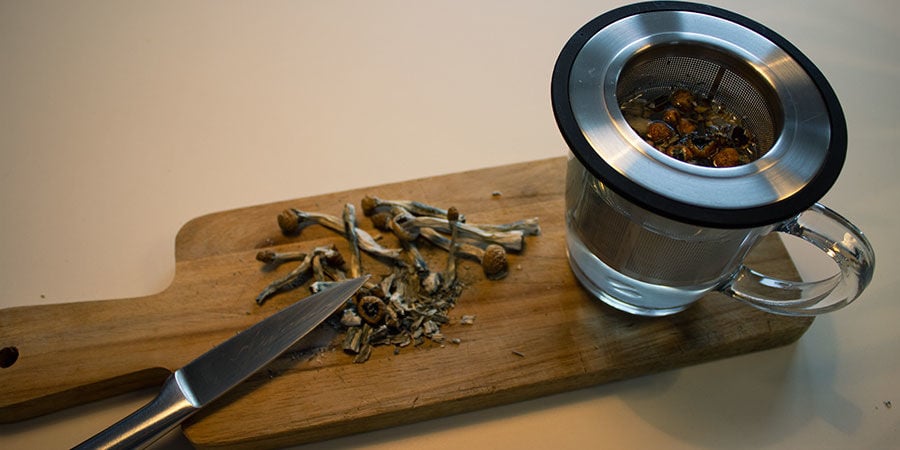
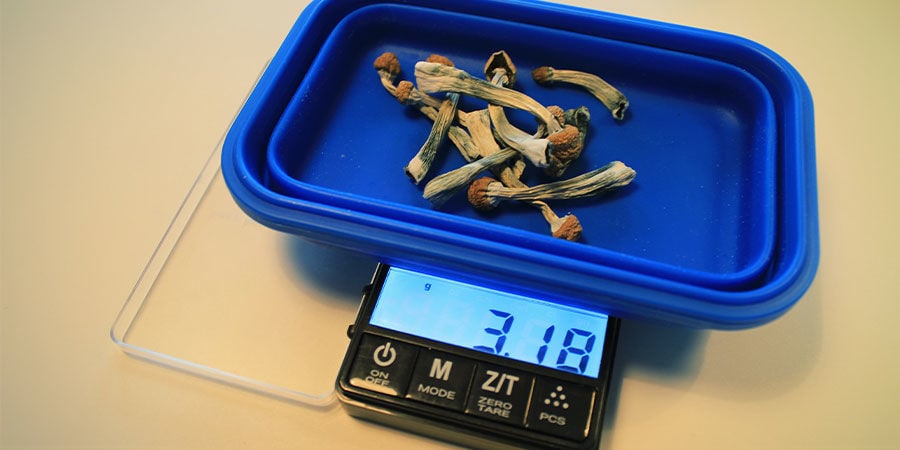
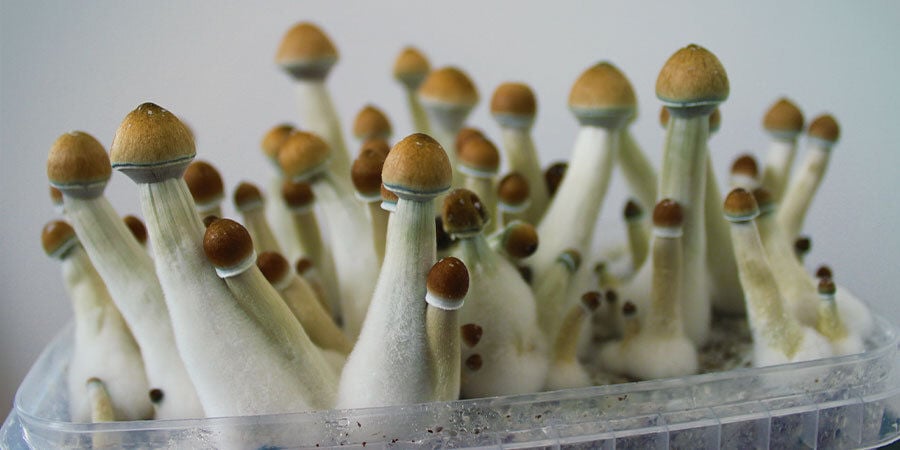
![How To Grow Magic Mushrooms Indoors [3 Methods]](https://www.zamnesia.com/uk/modules/prestablog/themes/responsive/up-img/slide_2060.jpg)

